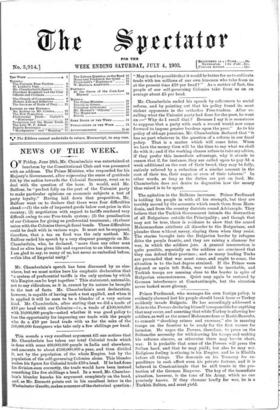NEWS OF THE WEEK.
ON Friday, June 26th, Mr. Chamberlain was entertained at luncheon by the Constitutional Club and was presented with an address. The Prime Minister, who responded for his Majesty's Government, alter eXiiressing the sense of gratitude felt by the nation towards the Colonial Secretary, went on to deal with the question of the hour. It would, said Mr. Balfour, be "perfect folly on the part of the Unionist party to make particular opinions on economic subjects a test of party loyalty." Having laid down that proposition, Mr, Balfour went on to declare that there were four difficulties ahead :—(1) the sale of imported goods below cost price in this country; (2) negotiation with regard to tariffs rendered very difficult owing to our Free-trade system; (3) the penalisation of our Colonies for giving us preferential treatment; (4) closer union with the Colonies through fiscal bonds. These difficulties could be dealt with in various ways. It must not be supposed, therefore, that a tax on food was the only method. Mr. Balfour ended his speech by a very eloquent panegyrie on Mr. Chamberlain, who, he declared, "more than any other man dead or alive has given life and expression to an idea common, I am glad to say, to many of us, but never so embodied before, —this idea of Imperial unity."










































